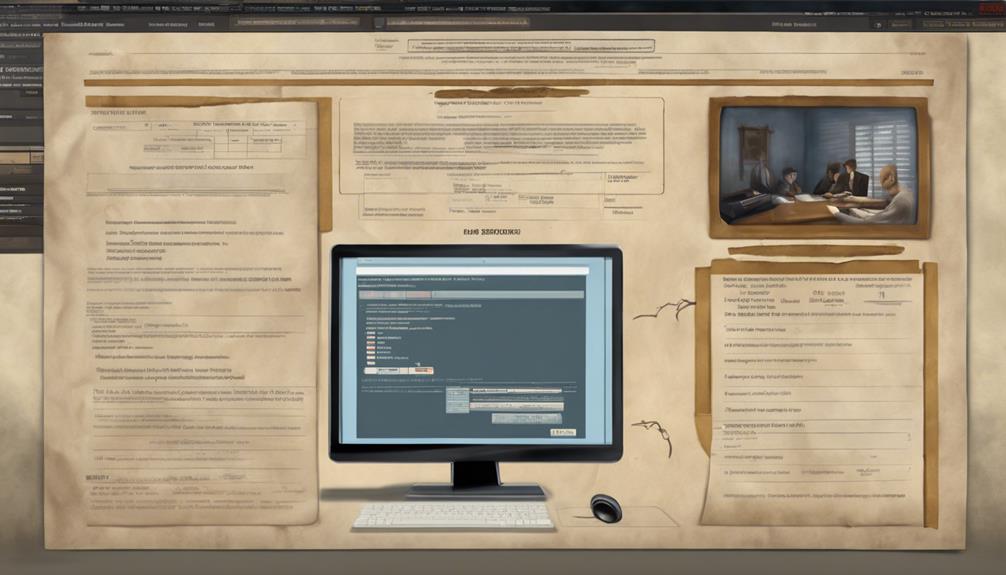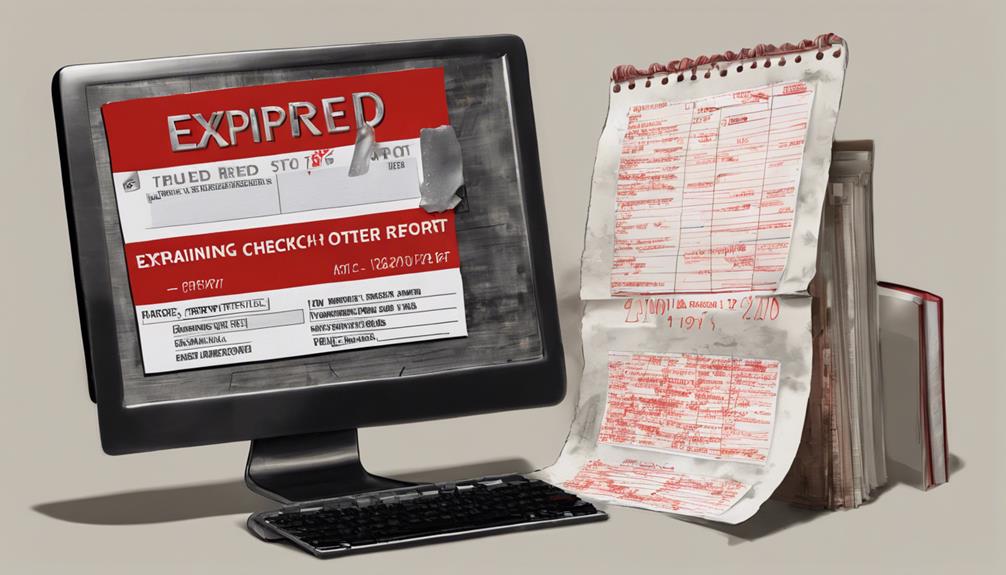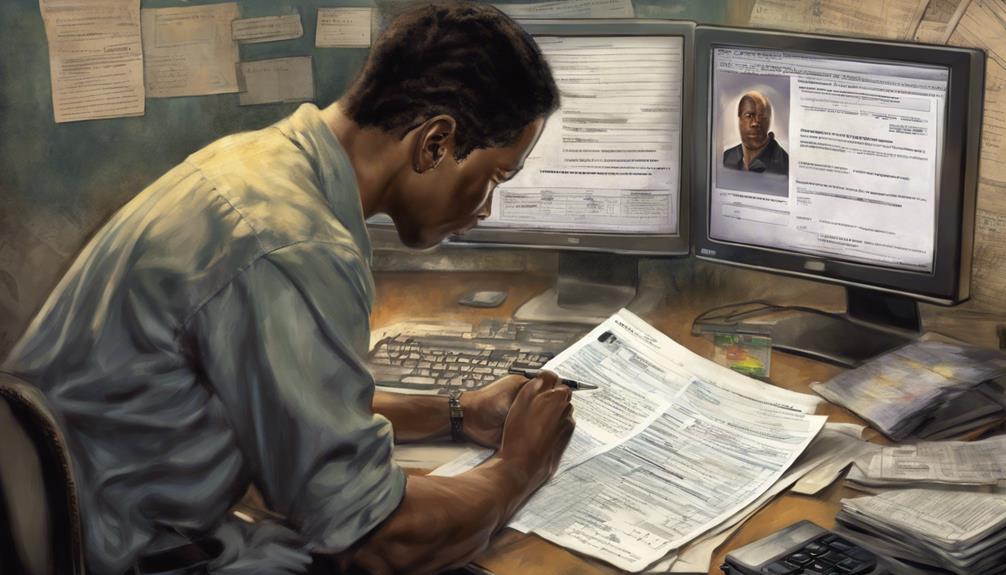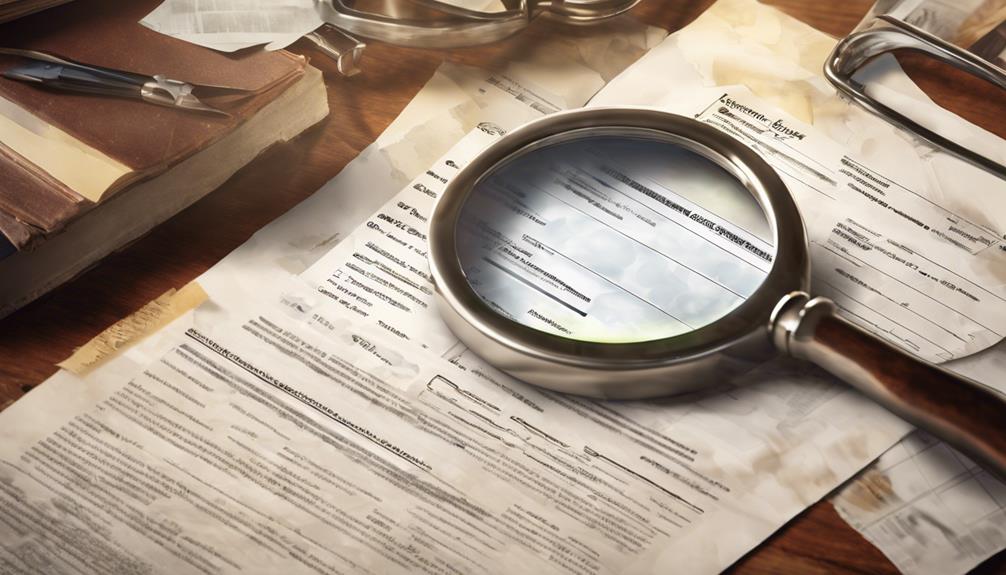Criminal charges, whether pending or resolved, can appear on background checks, influencing hiring choices and legal considerations. Employers must navigate complex laws and guidelines to guarantee compliance and fair treatment. Understanding the components of background checks, including criminal history details, is vital for informed decision-making. Mishandling pending charges can lead to legal consequences and discrimination claims. Seeking legal counsel helps employers navigate the complexities. It is important to handle pending criminal charges carefully to meet legal requirements.
Key Takeaways
- Criminal charges can appear on background checks.
- Employers consider pending charges in hiring decisions.
- FCRA and Title VII guide handling of criminal records.
- State laws vary on the disclosure of pending charges.
- Accuracy verification is crucial for background check results.
Understanding Pending Charges in Background Checks

Understanding pending charges in background checks involves evaluating unresolved prosecutor-filed charges awaiting court resolution. Employers must navigate state laws, EEOC guidelines, and legal considerations to make informed hiring decisions.
Pending charges, which are yet to reach a resolution through a plea agreement or trial verdict, can have varying visibility on background checks. These charges play an important role in influencing employment decisions and require thorough assessment by employers.
To handle pending charges effectively, employers need to seek legal counsel to make sure compliance with the Fair Credit Reporting Act (FCRA), Title VII of the Civil Rights Act, and other relevant regulations. Verifying the accuracy of criminal record information is essential to avoid potential discrimination issues and make fair judgments.
Employment Background Check Laws
Employment background check laws encompass regulations that govern the information permissible for screening potential employees, including restrictions imposed by the Fair Credit Reporting Act (FCRA) and Title VII of the Civil Rights Act.
The FCRA sets guidelines on how background check services can handle consumer reports, including criminal background checks, ensuring accuracy, fairness, and privacy. Title VII of the Civil Rights Act prohibits discrimination based on criminal records in employment decisions to promote equal opportunities for all applicants.
State laws also play an essential role in determining what information can be included in background checks, such as reporting arrests, convictions, or expunged records. Employers must navigate these legal requirements to conduct background checks lawfully and avoid potential legal issues that may arise from non-compliance with federal and state regulations.
Understanding the intricacies of employment background check laws is crucial for employers to make informed hiring decisions while safeguarding applicants' rights.
Components of a Background Check

When conducting a background check, employers typically include details on criminal history, employment verification, education validation, professional license confirmation, and pre-employment drug screening.
Criminal history components encompass case disposition, offense type, sentencing, and court outcomes. Employment verification confirms past job details are accurate. Education validation authenticates degrees and certifications. Professional license confirmation affirms the status and validity of licenses essential for specific roles. Pre-employment drug screening checks for substances like marijuana, cocaine, opiates, amphetamines, and PCP to evaluate candidate suitability.
When examining criminal charges, pending charges are a crucial part of background checks. Employers may conduct county checks to identify types of pending charges. Legal advice can be sought to understand the implications of non-conviction probation. In places like San Antonio, the specifics of pending charges can influence hiring decisions.
Understanding these components helps employers in making informed choices during pre-employment screenings.
Importance of Handling Pending Criminal Charges
Examining pending criminal charges in background checks is vital for employers to make fair and informed hiring decisions, guaranteeing compliance with legal requirements. Pending charges, while not proof of guilt, must be carefully evaluated to determine their relevance to the job at hand.
Mishandling these pending charges can lead to potential legal implications and discrimination claims. To navigate the complexities surrounding pending criminal charges in employment screening, seeking guidance from legal experts is advisable.
Criminal Background Check Information in Texas

A thorough overview of criminal background check information in Texas reveals the detailed records maintained by the Texas DPS on all criminal charges filed within the state. Employers in Texas heavily rely on criminal background checks to assess individuals' criminal histories and determine their suitability for specific job roles.
Private services conducting background checks in Texas must adhere to the Fair Credit Reporting Act, which imposes restrictions on reporting arrests.
Extensive Information: Criminal background checks in Texas provide comprehensive details on arrests, prosecutions, case dispositions, and sentencing.
Request Options: Background checks in Texas can be obtained through private services or directly from the Texas Department of Public Safety (DPS) website.
Employer Utilization: Employers in Texas use criminal background checks to make informed hiring decisions and guarantee the safety and integrity of their workplaces.
Frequently Asked Questions
Why Would a Charge Not Show up on a Background Check?
Charges may not appear on a background check due to recent filing, lack of processing, or specific check criteria. Dismissed, dropped, or sealed charges might not be included. Employers often focus on convictions, and the depth of the check influences what shows up.
Do Pending Charges Show up on a Background Check in Ct?
Pending charges in Connecticut may appear on background checks, depending on search depth and employer requirements. Employers in CT have access to this information, which can impact hiring decisions. Awareness of how pending charges can affect employment opportunities is essential.
Do Pending Charges Show up on a Background Check in Michigan?
Pending charges in Michigan may appear on background checks, contingent on the screening depth and employer's process. Michigan state laws regulate the reporting of pending charges in background checks, necessitating compliance from employers.
Do Pending Charges Show up on a Background Check in Alabama?
In Alabama, pending charges may appear on background checks based on search depth and employer preferences. State laws and charge severity influence visibility. Individuals with pending charges should be aware of potential disclosure to employers.
Conclusion
To wrap up, criminal charges do indeed show up on background checks, including pending charges. It's essential for individuals to address any pending charges promptly and responsibly, as they can impact various aspects of their lives, including employment opportunities.
By understanding the components of a background check and the laws surrounding them, individuals can take proactive steps to address any pending criminal charges and minimize any potential negative consequences.









